#Writing tips
Text
-:“We’re definitely just enemies, and not anything more” Enemies to lovers prompt :-
(*Wink wink* tag me if you write these.)
By @me-writes-prompts
“I want to wrap my hands around your throat, and choke you until the life in your eyes die down.” “Kinky.” ;)
“It’s funny, isn’t it? How we always end up, in the same place, at the same time.” “It’s not funny, I know you’ve been stalking me. That’s how we always end up together.” “Stalking? You? *scoffs* in your dreams.”
“Well, if it isn’t my favorite human being on the earth!” They say with fake excitement. “Oh thank you, but I regret to not say the same.”
“If you don’t care, then why are you holding my hand?” “So I can drag you down with me if we fall from this cliff/edge.”
Just deadass staring daggers at each other, and communicating with their eyes.
“Fuck you!” “Love you, too.” They say, blowing a kiss.
“I hate being in your presence, I hope you know that.” “You’re literally sitting half on my lap.” “Because there is nowhere else to sit!” (There was only one couch *snickers*)
“It just so happens that I put on my nicest outfit, just to find out that you’re my blind date.”
“Don’t look at me like that.” “Like what?” “Like you want to murder me but also like…you want me.” 😏
“It’s impossible not to hate you.”
“Look, I win. So back off okay?” “Stepping on my toe and reaching the ceiling is not winning.”
“Shut up before I-” “Before you what, huh? No, say it. Let me see if you can finish that sent-” *shoves the nearest thing into their mouth*
“Come here, let me see the cut.” “No.” *sighs and walks up to them* “Let. me. see.”
“You’re not that good looking, alright?” “So you admit I’m good looking?” “What? N-no. Never.”
“I love you.” “Huh?” “Is the last thing I would be saying, so get that delulu thought out of your mind, and leave me alone.”
“You’re such an idiot. Who steps on a knife unknowingly?” “It was in the middle of a dumpster, I didn’t see it!” “Someone needs glasses.” “Shut up!” (This is so random lmaooo)
#writers on tumblr#writeblr#prompt list#writing prompts#writing#imagine your otp#otp prompts#dialogue prompts#story prompt#otp#otp dialogue#otp memes#otp stuff#enemies to lovers prompts#enemies to lovers#enemies to friends to lovers#enemies to lovers prompt#prompts#fic prompts#fanfic prompts#ao3#enemies to lovers trope#writing ideas#writing inspiration#writing advice#writing prompt#writing stuff#romance prompts#writing tips#angst prompts
393 notes
·
View notes
Note
What is a good way to start a novel? (sentence frames)
Are you a creative writer struggling to get started on your next project? Do you find yourself staring at a blank page, unsure of where to begin? Fear not! Here are some sentence frames designed to inspire your creativity and help you generate story ideas.
Get to know your main character
[Character name] was not your typical [profession/role]; in fact, they…
Despite being [adjective], [character name] had always felt…
[Character name] had a secret, one that they had kept hidden for [time period]…
As [character name] looked out the window, they couldn’t help but wonder what life would be like if…
[Character name] had always been drawn to [hobby/interest], but had never had the courage to pursue it until…
The day [character name] met [another character], everything changed…
Setting the scene
The town of [name] was known for its [unique characteristic], but beneath the surface…
In a world where [fantastical element] was commonplace, [character name] stood out because…
The [building/location] had stood abandoned for [time period], but on this particular night there was [an event]…
The [place/location] was famed for its [unique characteristic], but [character] found themselves drawn to [thing]…
Introduce conflict
[Character name] had always believed that [belief], until [event] forced them to question everything.
When [character name] discovered [secret/revelation], they knew they had to…
The arrival of [character/object] in [setting] threw [character name]’s life into chaos, as they…
[Character name] had always been content with their [status quo], but when [event] occurred, they realised that they could no longer ignore their true calling.
The arrival of [character name] in [place/location] set off a chain of events that would uncover long-buried secrets and force the [people of location] to confront their darkest demons.
Show character growth
[Character name] had spent their entire life [doing/believing something], but now they began to wonder if…
As [event] unfolded, [character name] realised that they were capable of…
[Character name] had always been afraid of [fear], but in the face of [challenge], they discovered…
[Character name] used to [old behaviour], but now they [new behaviour]…
As [character name] faced [challenge], they discovered a [new strength/quality] within themselves…
[Character name] never thought they could [achievement], but with [catalyst], they learned to [lesson]…
Create suspense and mystery
[Character name] knew that [mystery/secret] held the key to [goal], but the closer they got to the truth…
As [character name] delved deeper into [investigation/quest], they began to suspect that…
The [object/clue] seemed insignificant at first, but as [character name] examined it more closely, they saw [detail].
[Character name] had a nagging feeling that something was off about [person/place/thing], but couldn’t quite put their finger on it until [event].
The [sound/smell/sight] was hauntingly familiar to [character name], but they couldn’t remember why until [event].
Explore character relationships
[Character name] had always looked up to [other character], but now they began to see them in a different light because [event/change].
Despite their differences, [character name] and [other character] found themselves drawn to each other because of [detail].
[Character name] knew that [other character] was hiding something, but they never expected [revelation].
[Character name] and [other character] were once inseparable, but [change] meant they grew apart.
[Character name] never expected to find a friend in [other character], but [character detail/event/location] brought them together.
[Character name] couldn’t shake the feeling that [other character] was hiding [secret] from them.
Remember, these sentence frames are just a starting point to help you generate ideas and get your creative juices flowing. Feel free to adapt, combine, or expand upon them to suit your unique story and writing style. The most important thing is to let your imagination run wild and enjoy the process of writing your novel!
#writing prompts#writing ideas#story ideas#writing inspiration#sentence frames#writing resources#writers#creative writing#writing#writing community#writers of tumblr#creative writers#writeblr#writerblr#writing tips#writing advice#writers on tumblr#creative writing prompt#fic prompt#story prompt#writing prompt#story prompts#let's write#writing asks#writers and poets#writer community#writers block#writer#beat writers block#writer's block
172 notes
·
View notes
Note
How would you write a character slowly going insane from their world going out of their control?
Writing a character slowly descending into madness as their world unravels can be difficult. It's important to weave in details that reflect the character's internal thoughts and emotions, allowing readers to empathise with and understand their descent into madness. Here's a step-by-step guide on how to develop such a character:
Establish Normalcy: Begin by portraying your character in their normal state, with clear goals, motivations, and a sense of control over their life. Show their relationships, routines, and aspirations to establish a baseline for their sanity.
Introduce Stressors: Gradually introduce stressors or challenges that disrupt the character's sense of control. These could be external factors like conflicts with others, unexpected events, or internal struggles such as doubts or fears.
Initial Denial: Initially, have your character respond to these stressors with denial or attempts to regain control. They may try to rationalise the events or attempt to solve problems using familiar methods.
Heightened Anxiety and Paranoia: As the stressors persist and escalate, your character's anxiety and paranoia will likely intensify. They may become hyper-aware of their surroundings, seeing threats where there are none, or interpreting innocent actions as malicious.
Deteriorating Behaviour: Show the character's behaviour becoming increasingly erratic or irrational. They may behave compulsively, exhibit mood swings, or withdraw from social interactions.
Hallucinations or Delusions: Introduce hallucinations or delusions that further blur the line between reality and fantasy. These could be sensory experiences like hearing voices or seeing things that aren't there, reinforcing the character's sense of losing touch with reality.
Breakdown of Relationships: As the character's behaviour becomes more unpredictable, their relationships may suffer. Friends and loved ones may become concerned or distant, further isolating the character and exacerbating their feelings of alienation.
Loss of Self-Control: Eventually, the character's grasp on reality may slip entirely. They may experience a complete breakdown, losing all sense of self-control.
Climactic Moment: Reach a climactic moment where the character's insanity reaches its peak. This could be a dramatic confrontation, a moment of self-realisation, or a final descent into madness.
Increased Conflict and Struggle: As the character's sanity erodes, they will encounter heightened conflict and struggle in their interactions with others and the world around them. Their irrational behaviour may lead to confrontations with friends, family, or authority figures. They may also face obstacles in achieving their goals as their deteriorating mental state impairs them.
Resolution or Consequences: Decide how the story will resolve for the character. Will they find a way to regain some semblance of sanity and control, or will they succumb entirely to their madness? How will this affect the rest of the plot?
Hope this helps!
#ask#writeblr#writing#writing tips#writing advice#writing help#writing resources#creative writing#character development#character writing#writing characters
127 notes
·
View notes
Text
NEED HELP WRITING? (a masterlist)
I have likely not added many that I've reblogged to this list. Please feel free to roam my blog and/or ask/message me to add something you'd like to see on this list!
Synonym Lists
Look by @writers-potion
Descriptors
Voices by @saraswritingtipps
Show, Don't Tell by @lyralit
Tips & Tricks
5 Tips for Creating Intimidating Antagonists by @writingwithfolklore
How To (Realistically) Make a Habit of Writing by @byoldervine
Let's Talk About Misdirection by @deception-united
Tips to Improve Character Voice by @tanaor
Stephen King's Top 20 Rules for Writers posted by @toocoolformedschool
Fun Things to Add to a Fight Scene (Hand to Hand Edition) by @illarian-rambling
Questions I Ask My Beta Readers by @burntoutdaydreamer
Skip Google for Research by @s-n-arly
Breaking Writing Rules Right: Don't Write Direct Dialogue by @septemberercfawkes
Databases/Resources
International Clothing
Advice/Uplifting
Too Ashamed of Writing To Write by @writingquestionsanswered
"Said" is Beautiful by @blue-eyed-author
88 notes
·
View notes
Note
Hello this is a question that came about from watching the new Fallout TV show and a character named Maximus. He’s a relatively neutral character and his arc is very wonderful coming from a writer and big book reader but I noticed that the average viewer doesn’t understand his character and actually hates him… my question is as an author is it okay to make your story more digestible to people who lack perception since it’s the general audience for mainstream media and how do you do that without losing your story? Idk this was probably too complex and a stupid question 💔
Not a stupid question! There are no stupid questions.
Going to unpack this a bit though. (I haven't seen the show.) First some general points, but then some advice on balancing complexity in a story.
So. Some things to get out of the way:
You don't know what the average viewer is thinking. Just because their opinion on a character is different to yours, doesn't mean they lack perception. Do we sometimes have an issue with critical thinking in the modern age? Yes. But we also live in an age where people bring a vast array of different insights and experiences into the stories they read/watch. 99% of the time a story doesn't have just one right interpretation, especially if it is a more complex narrative.
You CAN try to write a story that is more digestible to a general audience, but if you do have concerns about the media literacy of the general population, focusing on providing unchallenging stories is not the fix to that. People learn through engaging with interesting work and having discussions about them - e.g. when they are given the opportunity to. Perception, like anything, is a skill trained with practice. No one's born with it. There's no inherent us/them that can't be changed.
Will you be happy and fulfilled as a writer writing stories that you feel are dumbed or watered down? I know I wouldn't end up writing the versions of stories that I want. Similarly, you probably won't then attract the readers/audience that most resonate with your ideas, because you don't give them the chance.
Generally speaking, people hate being talked down to. As a reader/lover of stories, if I thought a writer was talking down to me and thought I was an idiot who couldn't understand the themes/plot, I wouldn't want to have anything to do with their stuff. It's a horrible feeling, isn't it? It's like being written off before you even leave the gate.
Okay, now some advice:
Amazing children's books are a great example of stories that are simplified to appeal and meet the audience where they are at, without losing the richness that makes them resonate and engage readers/audience. However, there are adult examples too. They share some qualities.
These often have:
Clear structure (there are a myriad story structures that you can use to make a story hit beats the reader expects and create a sense of satisfaction, while still giving you room to play.)
High concept story idea/plot (so, stories that can be explained/pitched in a line. E.g. children are forced to fight in televised death matches (Hunger Games), a famous author is imprisoned by a dangerous fan who doesn't approve of his new work (Misery), 'it's jaws in outer space!'). These stories have simple premises that often have wide-appeal, but the stories themselves can be complex.
Engaging main character(s) with a clear goal/agenda. They don't have to all be morally pure, but for an easy win, your character should be likeable/easy to root for. In a children's book, e.g. at the simplest level, these are often also high concept. (E.g. a mouse wants to be heard so is convinced it needs a lion's roar to be loved - The Lion Inside by Rachel Bright)
There are, of course, exceptions to every rule. Game of Thrones was phenomenally popular, for example, but I don't think it's an easy to sink into world/simple set of characters.
Watering down an existing story to fit a different target audience is often not going to lead you to write the best story. This is because it's like trying to fit a triangle into a circle, or make a banana bread into a savoury scone. However, there are plenty of stories with mass-appeal that offer readers a variety of different levels to engage with them, so it is very possible to write a brilliant story with mass appeal. But you work from the foundations up, not from the finished product down.
I hope this helps!
49 notes
·
View notes
Text
If you're stuck as a writer, I suggest you try writing kink fic for a fetish you don't actually have. It's a good exercise to get your brain juices flowing and break out of a rut.
47 notes
·
View notes
Text
ellie's writing tips
hellooo this is just a lil masterpost for the writing tips i have collected over my time writing since it's a question i get often!! this way it's all in one place <3 this is also for my own reference to look back on when i forget them lol
tips for specifically writing long fics
on coming up with a main storyline.
planning out a general idea & premise at the beginning of the fic that helps two characters get closer to one another, such as a forced proximity, some sort of mutual agreement, a mission to complete, etc. is a great way to get the ball rolling on a fic and can create environments between characters that feels connected and necessary rather than forced
on coming up with secondary storylines.
after laying down the main groundwork, building some side storylines adjacent to the main one that will give you options down the line to play with narratively (you don't need to figure out exactly what you want to do with secondary plotlines up front, but having them in place can create flexibility in your story to pivot towards some ideas if you'd like to later in the story)
on planning chapters & scenes.
it's wise to have a general idea for your series, but it's also okay to scrap those ideas if ultimately they don't work. there will be scenes that do not make sense or fit in the way you thought they would've, and making last minute decisions is okay and totally normal. sometimes better answers will find you along the way, and it's only a testament to how well you're getting to know your own story and also your own characters. it's also okay to plan multiple path ideas for your story, and choose whichever one fits best once you get to that point. it's not necessary to have a scene-by-scene in order to start writing! planning is useful, but writing is more important
on finding motivation to continue long fics.
having certain "key" scenes planned out in the very early stages of writing that you know you will look forward to writing can help with finding motivation. it will also help you find momentum to write during points where you might have some writer's block. also, one of the best tips i have seen for writing chaptered fics, is to end your chapters when you still have a little bit left planned. so cutting it like 10% short so that you have an immediate jumping off of point that you can start with for the next chapter
my general writing tips
inspiration. starting off w a concept or idea that you already know you like from a tv show or book works really well for fanfiction! for example if you like spiderman, then you can write a canon-adjacent spiderman au w your fave character from an anime or something. and then maybe once you start writing, your own original ideas start to come into play and you go off of those. i think in the fanfic community, people adore spin-offs & mainstream concept ideas
dialogue. my biggest tip for dialogue would be to just write all of your dialogue for a scene completely stripped down. none of the “he says” & “she says” or action verbs in between, just write it all out like it was a simple text convo w quotation marks. that way the words will sound realistic because you’re only picturing a convo in your head, rather than also trying to juggle all the descriptive prose. then, you can go back in to fluff things up. if it’s meant to be comedic or a fast-paced argument, keeping it relatively stripped down is the way to go, but if it’s something intense or suspenseful then fluffing it up may be the better choice. also, i find dialogue becomes easier the more you write for a specific character, so if it’s not flowing right away, don’t worry!! their words will find you eventually once you get to know the character better :)
on choosing conflicts. characters won’t always act perfect, but i think a great way to make conflict seem realistic is for them to act in character but with flaws, rather than out of character with flaws. maybe make a list of what that character’s good qualities and how those qualities could also work against them, and use the latter to brainstorm realistic conflict that those qualities could put them in (ex: a character is self-sufficient, but that causes them to rely on ppl less when they need it -> they fail to reach out for help in timely manners and leads to mistakes/regrets)
pacing. when starting off a story, don’t be afraid to just jump straight into it! or jump straight into the dialogue and then build the scene gradually as it progresses, rather than [big block of text in beginning of scene that reader must drag their eyes through] and then get to the dialogue. make sure the pacing fits the scene (romantic -> longer paragraphs more focused on subtle details, comical -> short paragraphs n dialogue heavy w simple n relatable diction, etc)
for tone and mood. to get words flowing for different scenes, it can be really useful to get into the environment of those scenes while you’re writing, such as listening to a song that fits the vibe of the scene prior to/during writing, or if its a scene at night, write it w the lights off, or watch a youtube vid w scenery that matches. may sound silly, but it could help!
read more. this is sort of a miscellaneous one but a good way to subconsciously get better at writing is to just read more! your brain kinda learns how to write on its own when you read. also, when i’m reading, if i see words i really like i jot them down in my notes app so i have my own lil vocabulary of words that i know i would like to use in my writing
on writing insecurities. be proud of your writing!! your first draft does NOT have to be perfect. some days the words will flow, but on some they won’t, and that’s okay. don’t get too into your head about “i wonder what readers will think of this plot point or this character action” etc, i think having faith in your own process but also in your readers will bring you a lot of peace as you write :) create what you want to create and the rest will follow!! at the end of the day it’s just a hobby and you should be writing what YOU want to write!! and just get started! ☺️ that’s the easiest way to write—is to just write 🫶🏼💕
use chatgpt. looool ai can be useful in writing too! i usually only use it after i'm completed with a draft, and i just plug select paragraphs into it to see if it can come up with some better words for me to use. it's also useful to come up with logistical details for aspects of your stories for world-building etc
#writing tips#writing advice#writing#writers on tumblr#creative writing#fanfiction#writing fanfiction#just writer things#writing pointers
36 notes
·
View notes
Text
When Worldbuilding Gets Weird
Imagine you’ve created an urban fantasy world. Real countries and landmarks still exist, and your fantasy elements have evolved around it, within it, beneath it. You’ve got your simple yet incredibly robust magic system (which, tbh, tends to be incredibly fun to play with, idiot-proof, and immune to plot holes), your ‘good guys’ and your ‘bad guys’.
Let’s say, for the sake of argument… your bad guys are animal-themed witches. And your good guys are split into two camps: Weapons masters, and their partners who magically transform into those weapons. They fight the witches in a power struggle of a nebulous *madness* that threatens to eat the world.
Also the good guys are led by the Grim Reaper, who has a tweenage son with crippling OCD. The weapons don't just kill people, they consume the souls of evildoers, and witches. Also there’s clowns, straight out of your nightmares, and a handful of wizards. And Excalibur is a person (or at least alive, personhood is up for debate). He will probably call you a fool, then invite you to afternoon tea.
Sound good?
Now for just a little salt to taste.... Both the sun and the moon have faces and are in constant states of laughter. Occasionally, you will hear the sun going hehehehehe. And the mool will drool blood.
Why? Why not? Do the characters ever question this? Nope. Is there ever an explanation? Nope. Do we, the audience, just roll with this? Yup.
Go watch or read Soul Eater and enjoy it as much as the rest of us do.
—
When you’re worldbuilding, don’t be afraid to get positively weird, for no reason and with no explanation. Our sun and moon might not have faces, but reality has plenty of its own weird.
Mushrooms. Platypi (Platypuses? Platypeople?). Everything that lives below the Mezopelagic zone of the ocean. Jellyfish. Cicadas. Superb lyrebirds. That glitch in brain processing called Pareidolia. Using caffeine, nature’s poison, as an energy boost.
And on and on and on.
Don’t be afraid to not explain why your strange world element exists. If its mechanics or lore are central to the plot and could open a plot hole, then, yeah, some rules would be helpful. Otherwise? Let it be.
If your characters roll with the weird, your audience will too. Not every piece of worldbuild has to, or even should, mesh perfectly like a puzzle. Let historical archives contradict each other in laughably absurd ways. Make up a weird plant that just does that. Let the sky turn blood red for 20 minutes a day just because. Don't let anime keep a monopoly on the bizarre.
Get. Weird. Don’t explain or overcomplicate it. Just dream something up, say yeah that exists in my world now, and add it to the page.
#world building#writing advice#writing resources#writing tips#writing tools#writing#writing a book#writeblr#fantasy#anime#soul eater
33 notes
·
View notes
Text
Some writers are being complete snobs, so here's my pro tips for how to actually write stories:
Don't worry about being "perfect" - perfection is a myth
Never get too focused about planning things out early on because you'll write yourself into a corner later
Write for yourself - if you like your story then others will too
Don't worry about being "cringe" or messing up
Plotholes are good because fans can fill them in later
I'm a self-published author if you wanna know. It's not a big deal and people tend to go full linkedin over writing - don't do that. lol
21 notes
·
View notes
Text
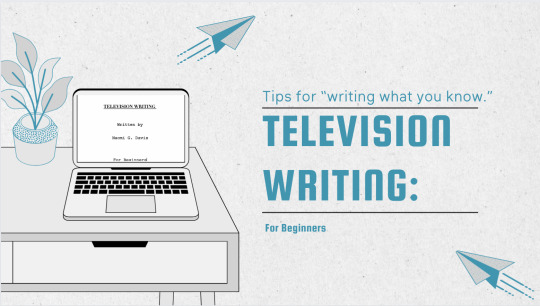
Over the years, due to the six shows I've been in the room for and my 19 years of entertainment industry experience, I have been a guest lecturer at NFMLA, Girls Write Now, NY Times Film School, and NYU - Tisch School of the Arts.
I'm in this group because I was a writer's PA and Writer's Assistant, but I was not promoted on the shows I was an assistant on. I optioned a pilot as an assistant and became a staff writer on a show I was completely unconnected to with the power of just my writing sample.
Over the years, many have pushed me to teach a course in order to share my unique take on "writing what you know" and writing a successful pilot script that will get you repped and staffed.
Here's the link: https://learntowritetv.teachable.com
I hope you'll check out my teachable course and I hope it will be helpful.
-N
In the course, "TV Writing For Beginners", experienced television writer Naomi G. Davis will introduce students to the fundamental principles and techniques of writing for television.
Whether you aspire to become a TV writer or simply want to explore the art of storytelling through this medium, this course will provide you with the tools and knowledge you need to get started.
From understanding the structure of a TV script to developing compelling characters and storylines, you will learn the essential skills required to craft engaging and entertaining television content from understanding story structure to crafting compelling dialogue and character arcs to elevate your TV writing skills.
#writing#writing tips#writerscommunity#TV#tv writing#Writing advice#writing resources#TV Writing tips#TV Show#The Marvelous Mrs. Maisel#The Get Down#Dash & Lily#Endgame#Splinter Cell#Endgame NBC#Writer#female writers#ao3 writer#on writing#writers#emerging writers#emerging writer#TV Writer's Room#Writer's Room
15 notes
·
View notes
Text
#worldbuilding#fantasy worldbuilding#writers#creative writing#writing#writing community#writers of tumblr#creative writers#writing inspiration#writeblr#writerblr#writing tips#helping writers#writing science fiction#fantasy world building#writing fantasy#writing games#writing exercise#writing exercises#let's write#resources for writers#writers on tumblr#how to write#writers and poets#writer's block#beat writers block#writers block#story inspiration#writer#writing advice
56 notes
·
View notes
Text
A general cane guide for writers and artists (from a cane user, writer, and artist!)
Disclaimer: Though I have been using a cane for 6 years, I am not a doctor, nor am I by any means an expert. This guide is true to my experience, but there are as many ways to use a cane as there are cane users!
This guide will not include: White canes for blindness, crutches, walkers, or wheelchairs as I have no personal experience with these.
This is meant to be a general guide to get you started and avoid some common mishaps/misconceptions in your writing, but you absolutely should continue to do your own research outside of this guide!
This is NOT a medical resource!!! And never tell a real person you think they're using a cane wrong!
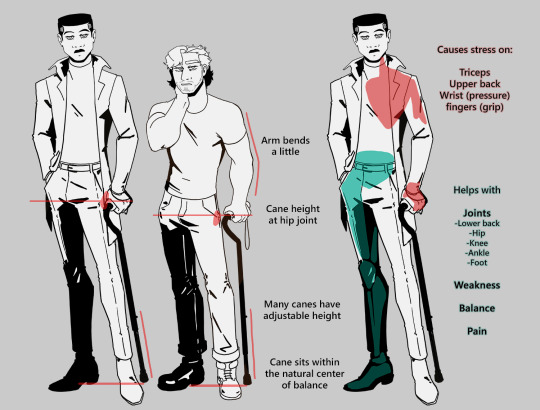
The biggest recurring problem I've seen is using the cane on the wrong side. The cane goes on the opposite side of the pain! If your character has even-sided pain or needs it for balance/weakness, then use the cane in the non-dominant hand to keep the dominant hand free. Some cane users also switch sides to give their arm a rest!
A cane takes about 20% of your weight off the opposite leg. It should fit within your natural gait and become something of an extension of your body. If you need more weight off than 20%, then crutches, a walker, or a wheelchair is needed.
Putting more pressure on the cane, using it on the wrong side, or having it at the wrong height can make it less effective, and can cause long term damage to your body from improper pressure and posture. (Hugh Laurie genuinely hurt his body from years of using a cane wrong on House!)
(some people elect to use a cane wrong for their personal situation despite this, everyone is different!)
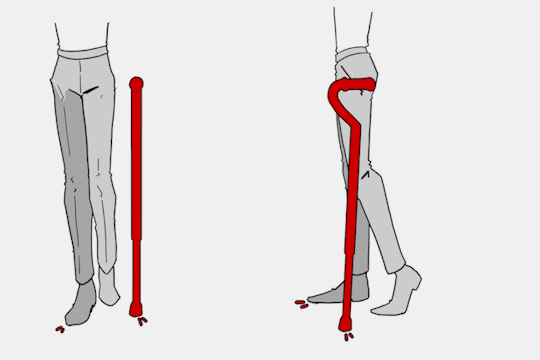
(an animated GIF of a cane matching the natural walking gait. It turns red when pressure is placed on it.)
When going up and down stairs, there is an ideal standard: You want to use the handrail and the cane at the same time, or prioritize the handrail if it's only on one side. When going up stairs you lead with your good leg and follow with the cane and hurt leg together. When going down stairs you lead with the cane and the bad leg and follow with the good leg!
Realistically though, many people don't move out of the way for cane users to access the railing, many stairs don't have railings, and many are wet, rusty, or generally not ideal to grip.
In these cases, if you have a friend nearby, holding on to them is a good idea. Or, take it one step at a time carefully if you're alone.
Now we come to a very common mistake I see... Using fashion canes for medical use!
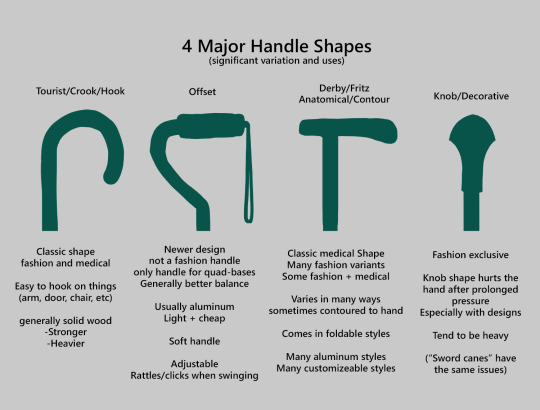
(These are 4 broad shapes, but there is INCREDIBLE variation in cane handles. Research heavily what will be best for your character's specific needs!)
The handle is the contact point for all the weight you're putting on your cane, and that pressure is being put onto your hand, wrist, and shoulder. So the shape is very important for long term use!
Knob handles (and very decorative handles) are not used for medical use for this reason. It adds extra stress to the body and can damage your hand to put constant pressure onto these painful shapes.
The weight of a cane is also incredibly important, as a heavier cane will cause wear on your body much faster. When you're using it all day, it gets heavy fast! If your character struggles with weakness, then they won't want a heavy cane if they can help it!
This is also part of why sword canes aren't usually very viable for medical use (along with them usually being knob handles) is that swords are extra weight!
However, a small knife or perhaps a retractable blade hidden within the base might be viable even for weak characters.
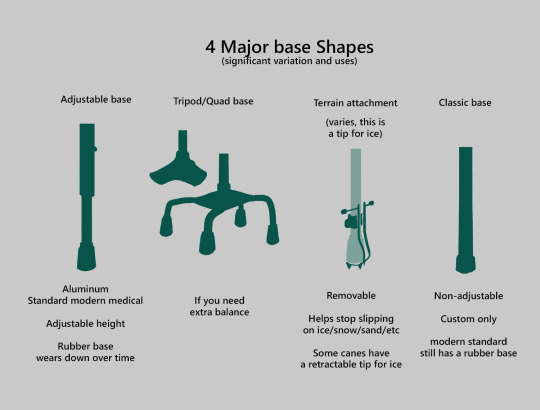
Bases have a lot of variability as well, and the modern standard is generally adjustable bases. Adjustable canes are very handy if your character regularly changes shoe height, for instance (gotta keep the height at your hip!)
Canes help on most terrain with their standard base and structure. But for some terrain, you might want a different base, or to forego the cane entirely! This article covers it pretty well.
Many cane users decorate their canes! Stickers are incredibly common, and painting canes is relatively common as well! You'll also see people replacing the standard wrist strap with a personalized one, or even adding a small charm to the ring the strap connects to. (nothing too large, or it gets annoying as the cane is swinging around everywhere)

(my canes, for reference)
If your character uses a cane full time, then they might also have multiple canes that look different aesthetically to match their outfits!
When it comes to practical things outside of the cane, you reasonably only have one hand available while it's being used. Many people will hook their cane onto their arm or let it dangle on the strap (if they have one) while using their cane arm, but it's often significantly less convenient than 2 hands. But, if you need 2 hands, then it's either setting the cane down or letting it hang!
For this reason, optimizing one handed use is ideal! Keeping bags/items on the side of your free hand helps keep your items accessible.
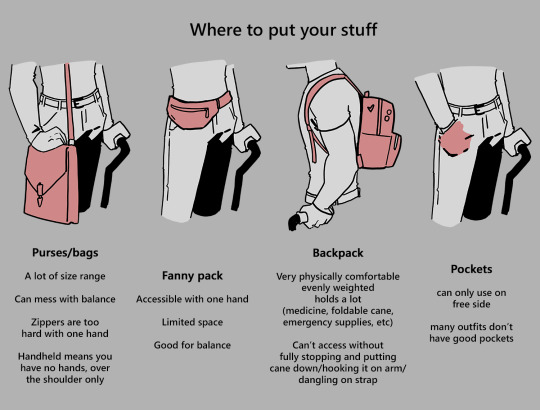
When sitting, the cane either leans against a wall or table, goes under the chair, or hooks onto the back of the chair. (It often falls when hanging off of a chair, in my experience)
When getting up, the user will either use their cane to help them balance/support as they stand, or get up and then grab their cane. This depends on what it's being used for (balance vs pain when walking, for instance!)
That's everything I can think of for now. Thank you for reading my long-but-absolutely-not-comprehensive list of things to keep in mind when writing or drawing a cane user!
Happy disability pride month! Go forth and make more characters use canes!!!
#mobility aid#cane user#writing tips#writing advice#drawing tips#art tutorial#art tips#art reference#art resources#art help#my art#long post
73K notes
·
View notes
Note
Do you have any advice on writing an actual book, that has no dialog?
Like I haven't started yet, and I don't know what I'm doing before hand, and I can't really find much.
Thanks for asking! Writing a book without dialogue can be a challenging endeavor, but it can also offer a lot of creative opportunities. Here are some tips to get you started:
Establish a strong narrative voice: Since you won't have dialogue to convey character personalities or interactions, your narrative voice becomes crucial. Develop a strong narrator who can guide readers through the story, offering insights, thoughts, and observations. Keep in mind that this will differ based on which perspective you're writing in (first person, second person, third person limited, or third person omniscient).
Focus on descriptive writing: Without dialogue, you'll rely heavily on descriptive prose to convey emotions, actions, and atmosphere. Use vivid imagery, sensory details, and evocative language to paint a rich picture of your story world.
Show, don't tell: This rule becomes even more important when writing without dialogue. Instead of telling readers what characters are feeling or thinking through dialogue, show it through their actions, body language, and internal reflections.
Create complex characters: While you won't have characters speaking directly to each other, you can still develop rich, complex characters through their actions, decisions, and internal conflicts. Give your characters depth by exploring their motivations, fears, and desires.
Use inner monologue: Since you won't have characters speaking their thoughts aloud, you can delve deep into their minds through inner monologue. Allow readers to see the inner workings of your characters' minds, their doubts, hopes, and fears.
Experiment with structure: Without dialogue to break up the text, you have the freedom to experiment with different narrative structures. You could use flashbacks, nonlinear storytelling, or multiple perspectives to enhance your story.
Focus on plot and pacing: With no dialogue to drive the story forward, you'll need to pay extra attention to your plot and pacing. Make sure each scene advances the story in a meaningful way and maintains the reader's interest.
Happy writing ❤
51 notes
·
View notes
Text
If you want to write a dumb little story with a dumb little plot and ridiculously silly characters. No one's stopping you. Genuinely, no one should be allowed to stop you. Write that dumb story with your whole heart and don't hold back.
#look I've deleted fics that made me feel awful#There's a time and a place#A good idea will come back to you again#But some things should be given time to settle#writeblr#writing tips#writing#writer advice#writers on tumblr
71K notes
·
View notes
Text
things people do after having a nightmare that isn’t crying
struggle to catch their breath
grab onto whatever’s close enough to ground themselves in reality
become nauseous / vomit
shake uncontrollably
sweat buckets
get a headache
things people do to combat having nightmares if they occur commonly
sleep near other people so they can hear the idle sounds of them completing tasks
move to a different sleeping spot than where they had the nightmare
leave tvs / radios / phones on with noise
just not sleep (if you want to go the insomnia route)
sleep during the day in bright rooms
things people with insomnia do
first, obviously, their ability to remember things and their coordination will go out the window
its likely they’ll become irritable or overly emotional
their body will start to ache, shake, and weaken
hallucinate if it’s been long enough
it becomes incredibly easy for them to get sick (and they probably will)
add your own in reblogs/comments!
33K notes
·
View notes
Text
Pirate Terms and Phrases
-> Pirate Lingo
-> A Pirate's Glossary
Batten Down The Hatches - tie everything down and put stuff away for a coming storm.
Brig - a prison on a ship.
Bring a Spring Upon 'er - turn the ship in a different direction
Broadside - the most vulnerable angle of a ship that runs the length of the boat.
Cutlass - a thick, heavy and rather short sword blade.
Dance with Jack Ketch - to hang; death at the hands of the law (Jack Ketch was a famed English executioner).
Davy Jones's Locker - a mythical place at the bottom of the ocean where drowned sailors are said to go.
Dead Men Tell No Tales - the reason given for leaving no survivors.
Flogging - severe beating of a person.
Gangplank - removable ramp between the pier and ship.
Give No Quarter - show no mercy.
Jack - flag flown at the front of the ship to show nationality.
Jolly Roger - black pirate flag with a white skull and crossbones.
Keelhaul - a punishment where someone is dragged under the ship. They are cut by the planks and barnacles on the bottom of the ship.
Landlubber - an inexperienced or clumsy person who doesn't have any sailing skills.
Letters of Marque - government-issued letters allowing privateers the right to piracy of another ship during wartime.
Man-O-War - a pirate ship that is decked out and prepared for battle.
Maroon - to leave someone stranded on a. deserted island with no supplies, typically a punishment for any crew members who disrespected the captain.
Mutiny - a situation in which the crew chooses a new captain, sometimes by forcibly removing the old one.
No Prey, No Pay - a common pirate law that meant crew members were not paid, but rather received a share of whatever loot was taken.
Old Salt - experienced pirate or sailor.
Pillage - to steal/rob a place using violence.
Powder Monkeys - men that performed the most dangerous work on the ship. They were treated harshly, rarely paid, and were expendable.
Privateer - government-appointed pirates.
Run A Shot Across the Bow - fire a warning shot at another boat's Captain.
Scurvy - a disease caused by Vitamin C Deficiency.
Sea Legs - when a sailor adjusts his balance from riding on a boat for a long time.
Strike Colors - lower a ship's flag to indicate surrender.
Weigh Anchor and Hoist the Mizzen - an order to the crew to pull up the anchor and get the ship sailing.
If you like what I do and want to support me, please consider buying me a coffee! I also offer editing services and other writing advice on my Ko-fi! Become a member to receive exclusive content, early access, and prioritized writing prompt requests.
#creative writing#writeblr#pirate writing prompts#pirates#pirate au#glossary#pirate lingo#pirate terms and phrases#pirate language#pirate vocab#pirate vocabulary#victorian slang#how to talk like a pirate#how to write#writing tips#fiction writing#writing advice#writing help#writing resources
12K notes
·
View notes